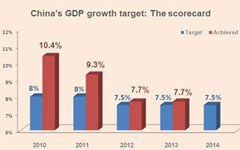As China has started to fulfill its economic potential of the past 20 years, it has become one of the key global economic players. Its first big global contribution occurred as an exporter of manufactured products to developed countries.
From the mid-1990s, the impact of China's huge, low-cost labor force provided global consumers with a wide range of everyday items, at much lower prices. From early this century, China's global impact increased, as its demand for commodities to build its infrastructure drove large increases in raw material prices.
Higher commodity prices made an enormous difference to the external finances and wealth of many emerging countries, from Chile in South America, to the Democratic Republic of Congo in southern Africa.
|
 |
 |
Led by China, the emerging world has come to play an ever larger role in the world economy.
It is unsurprising then that the International Monetary Fund predicts that by 2020 the emerging countries, of which China is easily the largest, will contribute almost the same to global growth as the advanced global economies, 42 percent of global GDP against 44 percent. The comparison is striking if GDP is adjusted for widely different price levels. Using purchasing power parity, in 2020 the emerging world will account for 55 percent of global GDP, while the advanced economies will contribute only 34 percent.
But the influence of the emerging world on global governance will have to increase substantially if international organizations like the IMF and the G7, now dominated by the advanced nations, are not to subside into irrelevance, says a report issued last month by Jim O'Neill, former chief economist of Goldman Sachs, and Alessio Terzi, of the Breughel Institute in Brussels.
So it was a shock when in January and again in March, the US Congress did not support a 6 percent increase in the voting power at the IMF of the emerging countries, along with a doubling of the IMF's capital, which the IMF board authorized in 2010. This was even though the proposed change would not alter the US' position in terms of votes, because all votes gained by the emerging countries would be taken from Europe, which under the proposed changes would lose representation in the IMF in line with its declining economic significance.
